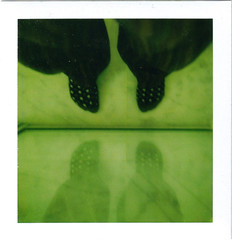 Image by clspeace via Flickr
Image by clspeace via FlickrBy Linda Ld Jacobson, APR
Ponzi schemes, bank failures and million-dollar bonuses. The public barometer of trust in U.S. corporations measured a frail 38 percent for informed publics, aged 35 to 64, according to a StrategyOne survey in December 2008. Public backlash ballooned, erupting against those companies guided by a moral compass different from that of Main Street.
Under this public scrutiny, how can PR professionals assess whether an organization is steering an ethical course? And what strategies can PR pros implement if they find an enemy from within?
The Looking Glass
As a first step to understanding an organization’s ethics, PR professionals can perform a “looking glass” exercise that allows them to view an organization’s actions from two different moral perspectives, utilitarianism and communitarianism. In a utilitarian model, an organization stresses positive outcomes that produce the greatest good for the largest number of stakeholders, placing a priority on consequences. A communitarian ethic balances individual freedoms and social responsibility so that an organization’s decisions result from values expressed by its stakeholders.To perform the exercise, focus both utilitarian and communitarian lenses on a particular corporate action, using PRSA member values: advocacy, honesty, expertise, independence, loyalty and fairness. Prioritize these values first within one model, then the other.
Jacque Lambiase, associate professor of strategic communications at Texas Christian University, uses this exercise to illustrate how the same values can produce very different outcomes. She says that objectively gauging corporate ethics is helpful for pros in the middle of a crisis or for those who experience a disconnect between corporate policy and corporate actions.
Red Flags
Unfortunately, when organizations begin to stray from an ethical course, PR pros aren’t always able to pinpoint the departure. But certain red flags can signal shifts in a company’s moral compass: 1. The organization’s decisions reflect an absence or low priority on ethics. Many organizations say that integrity is a core value, but the real test is whether the C-level emphasizes that value and demonstrates that behavior.
At American Airlines, Charley Wilson, managing director, external communications and international advertising, says that during a recent crisis, the airline’s CEO requested that a customer’s family receive the first communication, one of sympathy, before making any statement. That type of ethical leadership powerfully impresses employees. Indeed, a 2007 Deloitte & Touche Ethics and Workplace Survey revealed that 42 percent of employees believe that management’s behavior positively impacts organizational ethics. “We require our team to adhere to the airline’s standards of conduct, but nothing beats a leader who walks the talk,” says Wilson.
2. The organization does not show an overt commitment to ethics. Just because an organization says it is ethical does not mean it acts ethically. Ask these questions: Does the company corporately abide by a code of ethics? Are its values taken seriously internally? Is there infrastructure to support ethics or ethics compliance? Internally, does the company encourage open communications?
Reace Alvarenga Smith, APR, PR manager for Texas Health Resources, says that her organization places special emphasis on the company’s code of conduct, known as their company’s promise. “We provide monthly training sessions on what our promise means and behaviors we expect from employees,” Smith says. “Our promise gives us a filter by which we make all our corporate decisions and foster open discussions.”
Recent research undertaken by Jinae Kang, a doctoral student at The University of Alabama, reinforces PR perceptions of ethical practice in an open communications structure.
3. The organization lacks a robust fact-checking and approval process. PR professionals most often work collaboratively or cross-functionally when crafting communications. This means that attorneys, executives or coworkers review documents for factual errors or suggestions. If this process is absent, that indicates lax oversight. Wilson says that the airline’s Corporate Communications team complies with both the letter and the spirit of the law. If an issue arises, leaders at the company guide discussions, but decisions are rarely made in a vacuum.
4. The organization shifts responsibility. Lambiase points to an example in 2007 when a tiger at the San Francisco Zoo killed a visitor. “In addition to releasing incorrect information, the zoo director maligned the victim rather than focusing on the zoo’s responsibility to keep the public safe.” When things go wrong, ask yourself and your team whether the organization looks at its own role or assigns blame to others.
Ethics Strategies
PR pros who find themselves working with or for an unethical organization can employ a number of strategies, according to Dr. Karla Gower, director of the Plank Center for Leadership in Public Relations:- Arm yourself with knowledge. Know the laws and regulations that concern the organization’s industry, especially laws dealing with communications. Be able to discern if something is seriously amiss with a company’s financial statements.
- Prepare for a variety of crisis situations now. Once a crisis occurs, there is more potential for the legal response to take over at the expense of public relations. Gain buy-in now on the priorities for making appropriate and sensitive messages.
- Trust your instincts. Don’t blindly accept assignments. Ask questions!
- Begin a campaign for ethics. Occupy the role of ethics counselor, and campaign for the organization to adopt ethical practices.
Linda Ld Jacobson, APR, is the principal of Que Public Relations and an instructor of PR ethics at The University of North Texas. She can be reached at ljacobson@quepr.com or via Twitter @LindaJacobson.
![Reblog this post [with Zemanta]](http://img.zemanta.com/reblog_e.png?x-id=99563c2b-3c1b-48c7-b08c-a1522f666443)
No comments:
Post a Comment